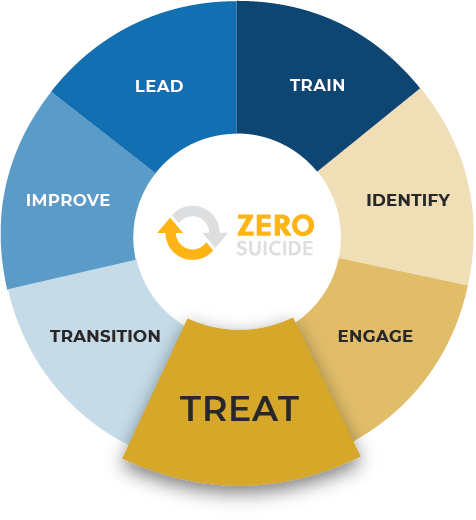Together we can make health and behavioral health care systems suicide safer.
Zero Suicide is a policy initiative, belief, and commitment that death by suicide for individuals under care within health and behavioral health systems are preventable. Born out of the Action Alliance Clinical Care Task Force, it offers a practical framework calling for a system-wide transformation to raise the standard of of suicide-specific care.
The Zero Suicide Framework launched in 2012 as part of the National Action Alliance for Suicide Prevention. Since then, it has shown significant decreases in suicide rates and behaviors while enhancing the use of evidence-based practices.
CAMS: An Effective Approach to Achieve Zero Suicide
In my 30+ years in the field, I’ve never seen anything like Zero Suicide make as much change as it is already.
Dr. David Jobes
CAMS is referenced in the Zero Suicide Toolkit and has been successfully integrated into many Zero Suicide initiatives worldwide.
Dr. Jobes, a charter member of the Action Alliance Clinical Care Task Force, played a pivotal role in shaping Zero Suicide as a policy initiative and continues to contribute as a Zero Suicide faculty member.
Due to its adaptability, CAMS can easily incorporate into various healthcare settings, aligning with the Zero Suicide sub-goal of direct suicide treatment. Numerous organizations throughout the United States that are adopting the Zero Suicide approach have completed CAMS training.
We’d love to work with you to help you commit to Zero Suicide and meet your suicide prevention goals.
CAMS & the Zero Suicide Toolkit: Train, Identify, Engage, and Treat
The Zero Suicide Toolkit consists of 7 comprehensive elements. CAMS consistently contributes to all seven elements in the Zero Suicide Toolkit, with significant contributions to the last four elements — training, identifying, engaging, and, most importantly, treating — individuals at risk of suicide.
- CAMS requires a different kind of leadership for preventing and treating patients experiencing suicidal thoughts and behaviors
- CAMS-care offers affordable, scalable, and customized training options across treatment modalities
- CAMS-care also provides education training in suicide statistics, research and evidence and outcome-based treatments for your whole organization and training for clinicians in CAMS
- CAMS and the Suicide Status Form includes a comprehensive assessment to effectively identify individuals at risk for suicide
- The Suicide Status Form engages the patient and clinician as active participants in the patient’s treatment with a suicide care management plan
- CAMS is one of only a few evidence-based suicide-specific treatments that mental health professionals can learn quickly and affordably
- CAMS supports transition by tracking a patient’s risk for suicide until resolution
- CAMS is committed to improving patient-centered, suicide-specific care through data-driven measurement and evaluation, specifically around training plans, screening, assessing and risk determinations, and safety planning.

CAMS & Zero Suicide Success Stories
Since its launch, Zero Suicide has gained tremendous traction, from small to large health care systems and from local to national systems.
Zero Suicide in Vermont
In 2015, the Vermont Department of Mental Health (DHM) committed to the Zero Suicide framework for statewide suicide prevention efforts. Their findings underscore the need for continued focus on utilizing the CAMS Framework. It also highlights the importance of effective training programs to train more clinicians in CAMS.
Learn more about Vermont Zero Suicide (PDF)
Download the Lessons Learned Report (PDF)
Suicide Prevention Using Evidence-Based Practices in Ohio
Ohio has been investing in effective, evidence-based suicide prevention practices for many years. Ohio is one of the first states to train over 1,000 clinicians in treating suicidal people, using the evidence-based, suicide-focused Collaborative Assessment and Management of Suicidality (CAMS) Framework.
Learn more about Ohio’s Use of the CAMS Framework
Frequently Asked Questions
Evidence-based treatments like CAMS are central to Zero Suicide implementations. CAMS consistently contributes to all seven elements in the Zero Suicide Toolkit, with significant contributions to the last four elements — training, identifying, engaging, and, most importantly, treating — individuals at risk of suicide in the following ways:
- Requires a different kind of leadership for preventing and treating patients experiencing suicidal thoughts and behaviors
- Affordable, scalable, and customized training options across treatment modalities
- Identifies suicidal risk early on to keep the patient out of the hospital
- Collaboratively engages both the patient and the provider as active participants in the patient’s treatment
- Proven effectiveness to treat suicidal ideation in 6-8 sessions
- Supports transition by tracking a patient’s risk for suicide until resolution
CAMS-care provides the only authorized training in CAMS that readily fits well into a Zero-Suicide policy effort. Dr. Jobes has been involved in the Zero Suicide movement since its inception and CAMS is consistently used within Zero Suicide initiatives as one of only a handful of suicide-specific evidence-based approaches to suicidal risk according to replicated randomized controlled trials. Please contact us for more information.
Yes, CAMS is an excellent evidenced-based suicide-specific clinical intervention that is well suited for suicide prevention efforts funded by GLS. Many CAMS trainings have been conducted for state organizations and Native American behavioral health providers over the past several years.
Please complete our Inquiry Form for more information and a member of our team will contact you as soon as possible.